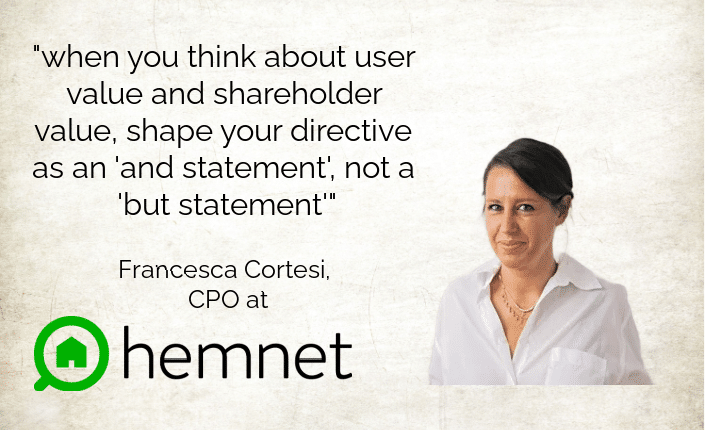
Hemnet is the indisputable number one real estate portal in Sweden. The portal claims to generate 19 times more visits to its property listings than its nearest competitor and says that 90% of properties that are sold in Sweden are sold via its platform.
Hemnet has been publicly traded since April 2021, with the firm achieving net sales of circa $244M in Q3 2023:
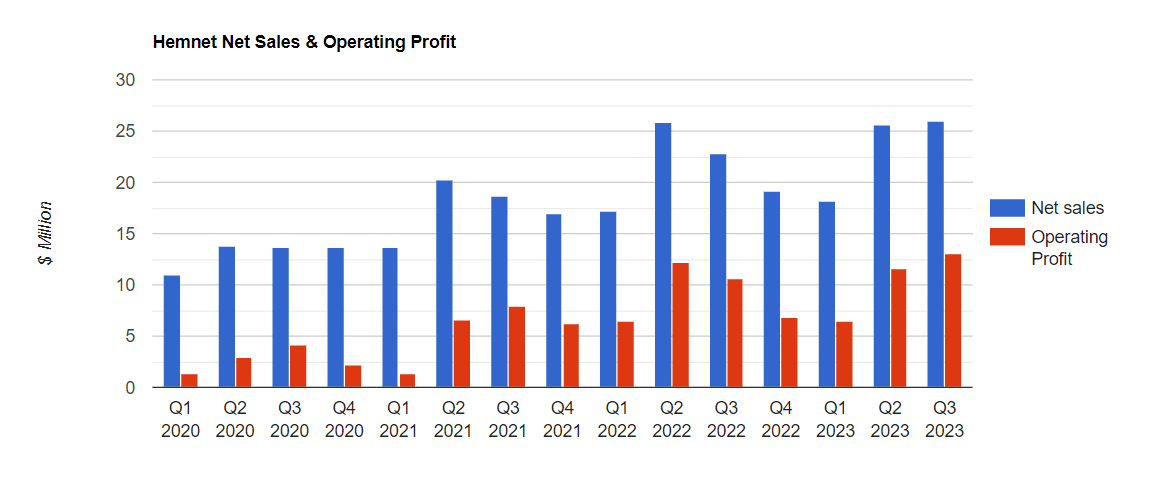 But what makes Hemnet so interesting is that it operates in a vendor-paid market—that is, property sellers pay to list and market their properties.
But what makes Hemnet so interesting is that it operates in a vendor-paid market—that is, property sellers pay to list and market their properties.
The portal's model has changed significantly since 2019, with a strong focus on increasing Average Revenue Per Listing, which hit a high of SEK4,044 ($386) in Q4 2022.
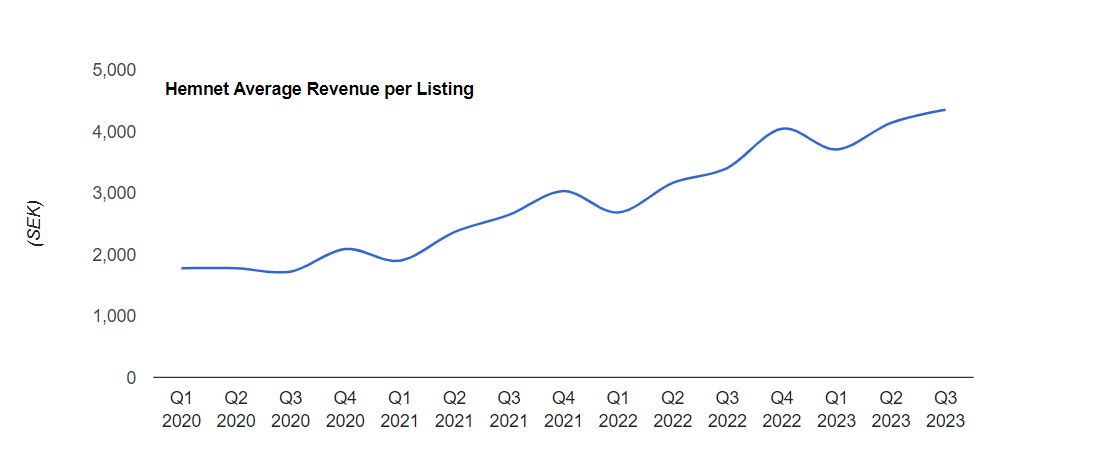 Francesca Cortesi is Chief Product Officer at Hemnet. As CPO, Cortesi is tasked with developing and implementing the strategies behind Hemnet's mission of monetizing the real estate listing.
Francesca Cortesi is Chief Product Officer at Hemnet. As CPO, Cortesi is tasked with developing and implementing the strategies behind Hemnet's mission of monetizing the real estate listing.
In the first of two interviews with Cortesi, we expand on the topic of her keynote presentation at the Property Portal Watch conference in Madrid in October. We discuss the nature of product development, Hemnet's strategy, and what a win-win proposition really looks like for real estate portals...
Francesca, yours was one of the most popular talks at the Property Portal Watch conference in Madrid in October.
Can you give us a brief outline of your keynote presentation and the takeaways for listeners?
In short, my presentation was about how we work with product development in order to create value for Hemnet while creating a win-win for our main target groups, specifically sellers and real estate agents.
How did you turn Hemnet's value proposition into a win-win?
So, the context for me is that I have been in product development for more than ten years across different industries, with Hemnet being my first experience in real estate.
It is essential to understand the role of Product in solving real customer pain and transforming it in a way that works for the business.
If you solve the pain the right way, you can monetize it.
It's the baseline of how we work, and then it is about creating value, especially for property portals—through which users are embarking on the biggest investment of their entire lives.
How did you achieve this?
Creating value and solving pain points is at the heart of product development at Hemnet. In Madrid, I spoke about how we focused on creating this win-win value, especially for two of the three target groups that we work with.
Hemnet's unique business model involves having the property seller pay directly for their listing, which is a rarity in the industry. We therefore develop products that help sellers maximize their profits during property sales.
Encouraging sellers to 'upgrade' their listings has been a significant driver of our growth.
The second target group is real estate agents. We wanted to create value for them, so we revamped our business model to serve as a revenue centre for agents rather than a cost centre. In reality, that means sharing a portion of the income we receive from the seller back to the agent offices.
We also introduced a commission system to encourage agents to become resellers of our value-added services. This approach creates a win-win scenario because agents have a compelling reason to recommend our products.
We have noticed that sellers tend to follow these recommendations because they trust the judgment of their agents, ultimately benefiting both the agents and our business.
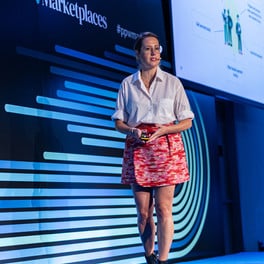
What are Swedish agents and sellers looking for most from their chosen property portal?
We consistently observe that property sellers regard the sale of their property as one of the most significant transactions in their lives—which will have a major financial impact on them.
So when we initiated our strategy five years ago, we hypothesized that sellers would be willing to invest more in their property listing if it meant maximizing their chances of selling at a higher price.
We therefore diversified our portfolio by introducing three different listing types and value-added services on top of our so-called "basic" offering.
The outcome has been that around half of our sellers now opt to upgrade their listings. Our initial hypothesis has proven true—when you give sellers the opportunity to enhance their property's visibility, they are willing to invest more in achieving this goal.
Above: Francesca Cortesi pictured on stage at Property Portal Watch, Madrid 2023
Do the value-added services grow the final sale price exponentially, or is it a small uptick?
In other words—are Hemnet users incentivised to go straight to the top offering?
That's an excellent question.
There are two key elements when it comes to our seller products. The first is the exposure your listing receives on Hemnet: simply put, the more people see your listing, the greater the chances that potential buyers will take an interest.
The Swedish market relies on open houses, so more exposure leads to more people attending these open houses, which therefore leads to competitive bidding and (hopefully) a higher sale price. This aspect is well within our control as we can manage how we showcase listings and provide more exposure to those sellers who are most willing to invest more.
The other crucial aspect is not just about exposure but ensuring that your listing reaches the most interested buyers. If I expose your listing to 100 people and 99 are not interested, then you won't get a good return on investment as a seller.
This is where the quality of matching buyers and sellers becomes paramount, which is at the core of any marketplace. When you have a platform that successfully connects buyers and sellers, it leads to repeat business because you provide a smooth experience for both parties. Sellers know they can find both quantity and quality, and buyers return because of the good matches they find.
So, we cannot make promises about a final sale price because so many variables are outside of our control. But what we can do is give a listing the best chance of making an impact and creating demand.
Where does the agent fit into the Hemnet proposition?
Real estate agents are Hemnet's most important partner and we strive to create a win-win proposition and always include their perspective in our product development.
Hemnet works by matching sellers and buyers, so agents using Hemnet are happy to communicate the win-win situation to new customers because we give the agents what they want.
But also, agents want more mandates. The good news for them is that every listing and every successful sale done in partnership with Hemnet strengthens their position for getting new business in the future. We show off their listings as part of their digital portfolio, which has a nice reputational boost for the agent as well.
On top of that, sellers put big trust in agents, and they play an important role in bringing our products to customers. We need to make sure that we create products that hit the pain points of the agent so that they are more willing to recommend them to sellers—if they do, they get a cut of that listing price through a commission.
Creating a financial alignment with the interests of agents could definitely be used as food for thought with other portals looking to get agents onside.
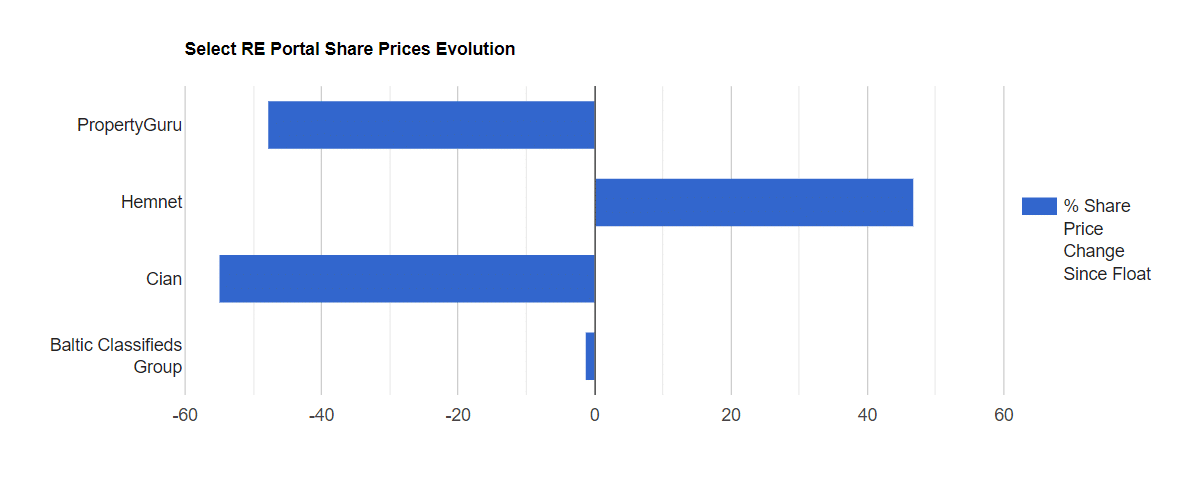
In other words, agents have a strong financial incentive to work closely with Hemnet.
Yes, and to create this win-win relationship with the industry is a cornerstone of our business.
Hemnet doesn't operate a C2C or FSBO offering, so you need an agent to list on Hemnet.
Hemnet is also a very quality-driven platform, where agents put in a lot of work to publish listings on our behalf—and they also get an administration fee from us for doing so.
In short, we pay agents to build good listings as a baseline.
On top of that, we have our opt-in commission agreement whereby an agent's office gets a percentage of any value-added service that a seller signs up for (Plus, Premium, Rocket and Republishing).
It means that agents are closely aligned with our journey. And the vast majority of agents sign up for it, which makes us happy because they see the value in the offering.
Meanwhile, agents are also getting an opportunity to market themselves, their sales capacity, and their results to the majority of the buyers in Sweden. This is a major branding advantage on top of the financial incentives—because the agents are regularly putting themselves in front of a highly relevant audience of buyers and sellers.
What stops the other agents who haven't opted into this offering?
We asked that question ourselves, and the short answer is that it depends.
The main feedback we get is that agents aren't aware of the product. Every time we push this offering, signups go up, so we can always use marketing to expand our reach.
In some other contexts, some agents are happy with the exposure they get at the base level: for example, those with fewer listings in a smaller region.
We approach these use cases as a seed for us to think about how we can develop the product further—to meet the needs of those agents that haven't yet found value in our offering.
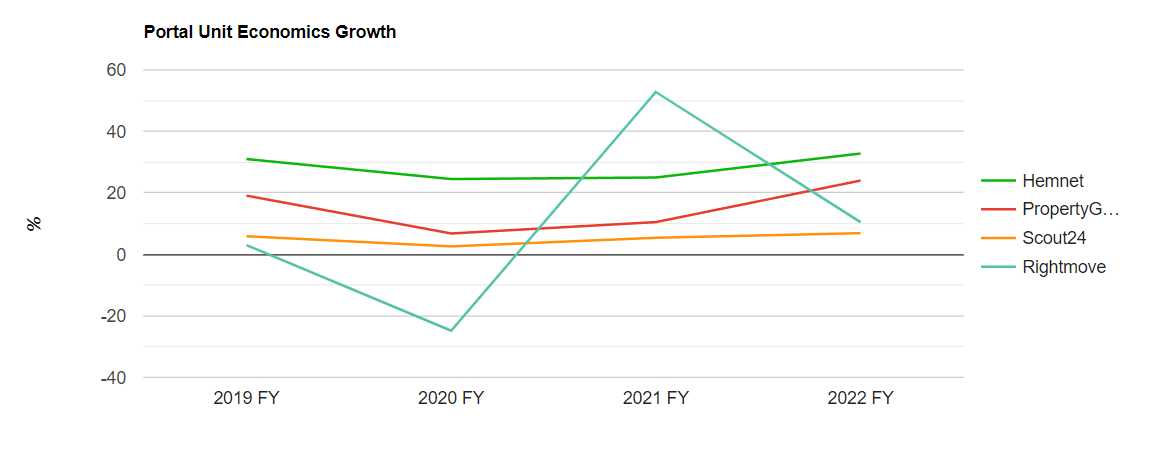
Hemnet is a publicly-owned market leader, which raises a challenge for you to deliver share price growth without impacting customer experience. How do you approach this challenge?
Any public company should be thinking about this.
For me, it is a matter of mindset—combining increased shareholder value with a better customer experience, not pitting them against each other. It isn't "one vs the other". Instead, it is about understanding that shareholder value is the same as user value.
Hemnet has the luxury of being a market leader and therefore we are able to focus on creating long-lasting value instead of a more short-term quarter-by-quarter growth strategy. Short-term revenue isn't our goal, it's about creating value and scale—but this can't be done overnight.
For us, that means investing time and effort into product development. We work hard to get our market insights, research and discovery so that we build something as right as possible.
Throughout 2023, we've added features to adapt to a buyer's market. For example, we added republishing as a feature of our top-tier product, and have created financial flexibility to make sure that payment is not any kind of barrier to list.
This was at the beginning of the year, and only now do we see the impact they're having—more sellers and more agents are jumping to this top-tier product.
The same is true for consumers. We've seen that property seekers are spending more time on our platform than they did last year.
What advice would you share with C-level execs who have a similar directive?
First I would say understand which customer group you need to focus on and their needs. Understand their pain points, and make sure to have a dialogue with the management team and shareholders to determine what is value creation, and what are your constraints.
Also, when you think about user value and shareholder value, shape your directive as an "and statement", not a "but statement".
What are our readers not paying attention to when it comes to their product development strategy that maybe they should be?
Also a really good question.
From my perspective, it's really important to not focus on having all the answers—you could research forever and never get to a stage where you're comfortable executing because there will always be missing information.
If you don't execute, you don't generate value. You also don't learn.
It's about striking the balance between conducting enough research to feel comfortable and confident enough to execute, and then building value out of that.
When we do this—and this happens all the time—we gain new insights that can be part of the next research, development and innovation stage.
For example?
For example, when I joined Hemnet in 2019, my hypothesis was that sellers would be willing to pay more money to the portal if they got a better sale in return.
Our research showed that sellers wanted exposure for their listing as a main priority, so we focused our research on that. We made progress, but not the progress we wanted, so we went back and found that we needed to pay more attention to the agent side in our analysis.
Sellers told us that they expected their agents to be more assertive, and stronger, and recommend solutions—after all, the agent is the expert in the industry, not the seller. This finding shaped future innovations, but it was born out of execution, not research.
What's next for Hemnet's win-win proposition?
You'll see! The beauty of thinking in a product development mindset is that every new product exposes a new need, a new problem, and a new pain point to be solved.
For example, we are focusing on the sellers' needs beyond maximising their profit. There are sellers who want to test the market first, there are sellers who want to sell anonymously, and there are sellers who want us to help them prepare their property for an open house for viewings.
And for agents, we are exploring the reasons behind why some value one premium product over another, and how we can understand them better and move them towards the best solution for them.
Every time we solve one problem, we find another one that has the potential to improve our product for our users.
The sky's the limit!
Notifications